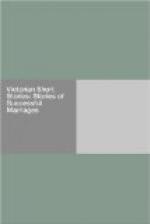He had ‘written’, it was known, but had never spoken, never spoken in particular of that; and he had the air (since, as was believed, he continued to write) of keeping it up in order to have something more—as if he hadn’t at the worst enough—to be silent about. Whatever his air, at any rate, Peter’s occasional unmentioned prose and verse were quite truly the result of an impulse to maintain the purity of his taste by establishing still more firmly the right relation of fame to feebleness. The little green door of his domain was in a garden-wall on which the discoloured stucco made patches, and in the small detached villa behind it everything was old, the furniture, the servants, the books, the prints, the immemorial habits and the new improvements. The Mallows, at Carrara Lodge, were within ten minutes, and the studio there was on their little land, to which they had added, in their happy faith, for building it. This was the good fortune, if it was not the ill, of her having brought him in marriage a portion that put them in a manner at their ease and enabled them thus, on their side, to keep it up. And they did keep it up—they always had—the infatuated sculptor and his wife, for whom nature had refined on the impossible by relieving them of the sense of the difficult. Morgan had at all events everything of the sculptor but the spirit of Phidias—the brown velvet, the becoming beretto, the ‘plastic’ presence, the fine fingers, the beautiful accent in Italian and the old Italian factotum. He seemed to make up for everything when he addressed Egidio with the ‘tu’ and waved him to turn one of the rotary pedestals of which the place was full. They were tremendous Italians at Carrara Lodge, and the secret of the part played by this fact in Peter’s life was in a large degree that it gave him, sturdy Briton as he was, just the amount of ‘going abroad’ he could bear. The Mallows were all his Italy, but it was in a measure for Italy he liked them. His one worry was that Lance—to which they had shortened his godson—was, in spite of a public school, perhaps a shade too Italian. Morgan meanwhile looked like somebody’s flattering idea of somebody’s own person as expressed in the great room provided at the Uffizi Museum for the general illustration of that idea by eminent hands. The Master’s sole regret that he hadn’t been born rather to the brush than to the chisel sprang from his wish that he might have contributed to that collection.




